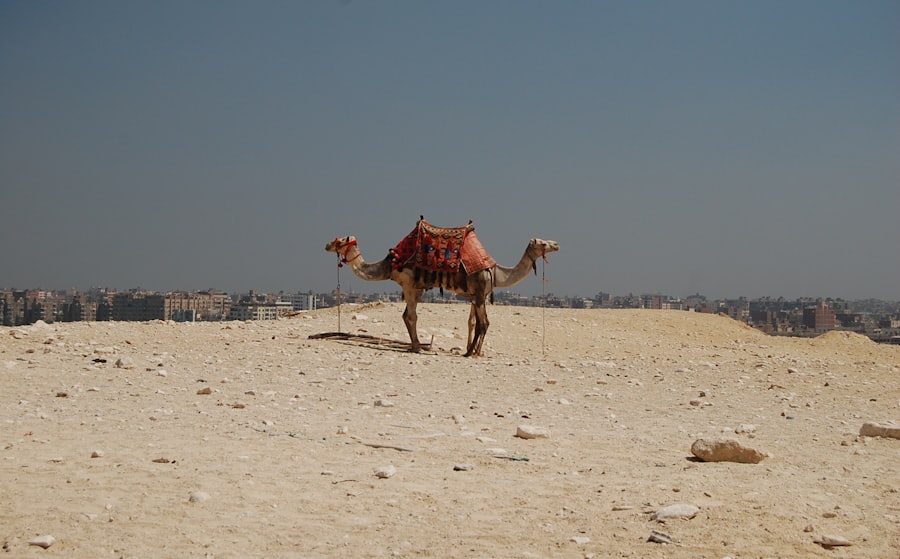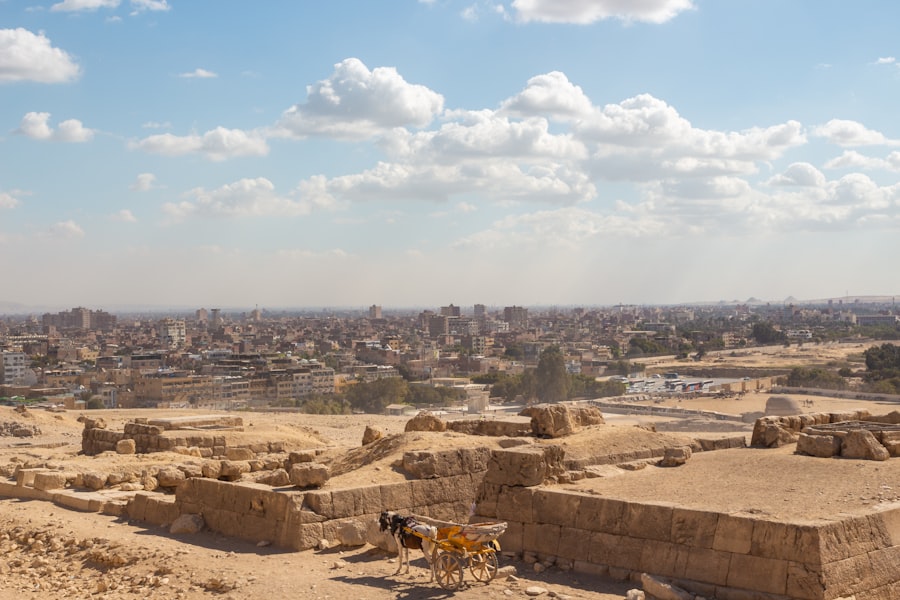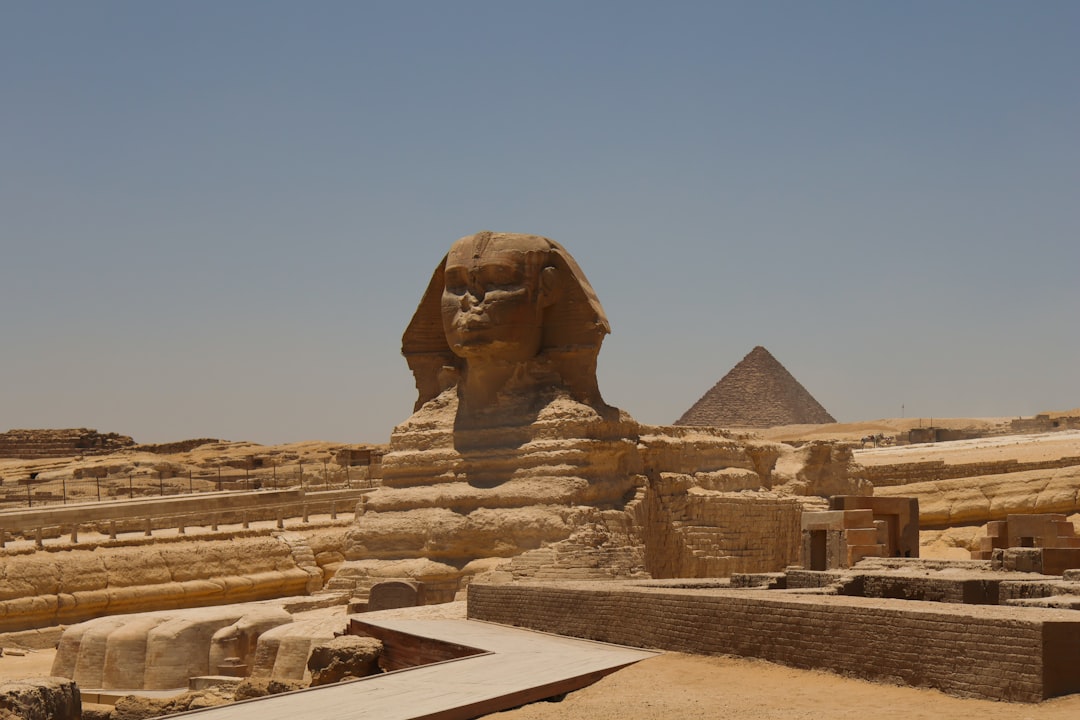The Giza Plateau, located on the outskirts of Cairo, Egypt, is one of the most significant archaeological sites in the world. It is home to the iconic Great Pyramid of Giza, built during the Fourth Dynasty of the Old Kingdom around 2580–2560 BCE. This monumental structure, along with the Pyramid of Khafre and the Pyramid of Menkaure, forms a part of a complex that has fascinated historians, archaeologists, and tourists alike for centuries.
The plateau also features the Great Sphinx, a colossal limestone statue with a lion’s body and a human head, believed to represent Pharaoh Khafre. The construction of these structures required advanced engineering skills and a vast workforce, showcasing the organizational capabilities of ancient Egyptian society. The history of the Giza Plateau is not merely confined to its monumental architecture; it also encompasses the rich cultural and religious practices of ancient Egypt.
The pyramids served as elaborate tombs for pharaohs, reflecting their beliefs in the afterlife and the importance of preserving the body for eternity. The plateau was a center for religious activities, where rituals were performed to honor the gods and ensure the pharaoh’s safe passage to the afterlife. Over time, the Giza Plateau has become a symbol of ancient Egyptian civilization, representing both its grandeur and its mysteries.
Key Takeaways
- The Giza Plateau holds significant historical and archaeological importance, with ongoing searches for the legendary Hall of Records.
- Edgar Cayce popularized theories about the Hall of Records, linking it to ancient wisdom and lost civilizations.
- Recent excavations have uncovered new findings, but challenges remain in fully accessing and verifying the Hall of Records.
- The Hall of Records is believed to contain valuable knowledge about ancient civilizations and their achievements.
- Preserving the Giza Plateau site is crucial for future research and exploration to unlock its historical secrets.
The Search for the Hall of Records
The Hall of Records is a legendary repository said to contain ancient knowledge and wisdom, believed to be hidden beneath the Giza Plateau. According to various accounts, this hall is thought to hold records of humanity’s past, including advanced technologies and spiritual teachings that could illuminate the mysteries of existence. The search for this elusive hall has captivated explorers, archaeologists, and spiritual seekers for decades, fueling numerous expeditions and investigations into the depths of the plateau.
The concept of the Hall of Records gained prominence in the early 20th century, particularly through the writings of various authors and researchers who claimed that such a place existed. They suggested that it was constructed by an advanced civilization that predated known history, possibly even before the rise of ancient Egypt. This idea has led to extensive speculation about what might be contained within its walls and how it could reshape humanity’s understanding of its own history.
Despite numerous claims and theories, no definitive evidence has been found to confirm the existence of the Hall of Records, yet the allure of its potential contents continues to inspire ongoing searches.
Theories and Speculations

Theories surrounding the Hall of Records vary widely, ranging from those grounded in historical context to more esoteric interpretations. Some researchers propose that the hall could be a physical location filled with scrolls or tablets containing knowledge from ancient civilizations. Others suggest that it may be more metaphorical, representing a collective consciousness or spiritual wisdom accessible through meditation or other means.
This divergence in interpretation reflects broader questions about humanity’s past and its connection to ancient wisdom. Speculation about the Hall of Records often intersects with theories about lost civilizations such as Atlantis or advanced prehistoric cultures. Some proponents argue that these societies possessed knowledge far beyond what is currently understood, including advanced technologies that could have influenced later civilizations.
This notion raises intriguing questions about how much humanity has forgotten over millennia and what insights might be recovered if such a hall were ever discovered. The interplay between myth and history continues to fuel debates among scholars and enthusiasts alike.
The Role of Edgar Cayce
| Aspect | Details | Impact/Significance |
|---|---|---|
| Full Name | Edgar Cayce | Known as the “Sleeping Prophet” |
| Active Years | 1901 – 1945 | Provided psychic readings for over four decades |
| Number of Readings | Approximately 14,000 | Extensive body of work covering health, spirituality, and prophecy |
| Primary Focus | Health, Healing, Spiritual Guidance, Prophecy | Influenced holistic health and metaphysical studies |
| Method | Trance readings with eyes closed | Unique approach to accessing subconscious knowledge |
| Legacy | Edgar Cayce Foundation (A.R.E.) | Preserves and promotes his work and teachings |
| Influence on Medicine | Alternative and holistic health practices | Early advocate for natural remedies and mind-body connection |
| Notable Predictions | Future events including geological changes and societal shifts | Continues to be studied for prophetic accuracy |
Edgar Cayce, often referred to as the “Sleeping Prophet,” played a pivotal role in popularizing the concept of the Hall of Records in the 20th century. Through his trance readings, Cayce claimed to access information from a higher consciousness, providing insights into various topics, including health, spirituality, and ancient civilizations. Among his many predictions was the assertion that a Hall of Records existed beneath the Sphinx or nearby pyramids, containing vital information about humanity’s origins and spiritual evolution.
Cayce’s influence extended beyond mere speculation; he inspired a movement focused on spiritual awakening and exploration of ancient wisdom. His followers sought to uncover evidence supporting his claims, leading to various expeditions aimed at locating the Hall of Records. While skeptics questioned Cayce’s methods and conclusions, his ideas resonated with many who were searching for deeper meaning in their lives and a connection to ancient knowledge.
The legacy of Cayce’s work continues to inspire those interested in metaphysical exploration and the mysteries surrounding ancient Egypt.
Recent Discoveries and Excavations
In recent years, advancements in technology have led to renewed interest in exploring the Giza Plateau and its potential hidden treasures. Ground-penetrating radar and other non-invasive techniques have allowed archaeologists to survey areas previously thought inaccessible without excavation. These modern methods have revealed anomalies beneath the surface that could indicate hidden chambers or tunnels, sparking excitement among researchers eager to uncover new findings.
Excavations around the Giza Plateau have also yielded significant discoveries that contribute to understanding ancient Egyptian civilization. Artifacts such as tools, pottery, and inscriptions provide valuable insights into daily life during the time of the pharaohs. While none have definitively pointed to the existence of the Hall of Records, these findings enhance knowledge about the cultural context in which such legends emerged.
As technology continues to evolve, there remains hope that future explorations may finally unveil secrets long buried beneath the sands.
The Significance of the Hall of Records

The significance attributed to the Hall of Records extends beyond its potential physical existence; it embodies humanity’s quest for knowledge and understanding. Many view it as a symbol of lost wisdom that could offer insights into spiritual truths and historical events that shaped civilization. The idea that such a repository exists taps into a deep-seated desire for connection with our past and a yearning for enlightenment.
Moreover, the Hall of Records represents a bridge between science and spirituality. For some, it serves as a reminder that there may be aspects of existence that transcend empirical understanding. This intersection invites dialogue between different fields of inquiry—archaeology, history, spirituality—encouraging a holistic approach to exploring humanity’s origins and purpose.
As interest in these themes grows, so does recognition of the importance of preserving sites like Giza for future generations.
The Connection to Ancient Civilizations
The search for the Hall of Records often leads to discussions about its potential connections to other ancient civilizations beyond Egypt. Proponents argue that advanced knowledge may have been shared among cultures such as those in Mesopotamia, Mesoamerica, or even Atlantis—a legendary civilization said to have existed thousands of years ago. This interconnectedness suggests that humanity’s history may be more complex than previously understood.
Exploring these connections raises questions about cultural exchange and diffusion throughout history. If advanced knowledge existed in one civilization, how might it have influenced others? The idea that ancient peoples shared insights across geographical boundaries challenges conventional narratives about isolated development.
As researchers continue to investigate these possibilities, they contribute to a broader understanding of human history as an intricate tapestry woven from diverse threads.
Challenges and Obstacles in Uncovering the Hall of Records
Despite ongoing interest in uncovering the Hall of Records, numerous challenges hinder progress in this endeavor. One significant obstacle is the sheer scale and complexity of archaeological work at sites like Giza. The area is not only vast but also layered with centuries of history, making it difficult to pinpoint specific locations for excavation without extensive research and planning.
Additionally, political instability in Egypt can complicate archaeological efforts. Changes in government policies or security concerns may limit access to sites or funding for research projects. Furthermore, there are ethical considerations regarding excavation practices—balancing scientific inquiry with respect for cultural heritage is paramount.
These challenges underscore the need for collaboration among archaeologists, historians, local communities, and governments to ensure responsible exploration while honoring ancient legacies.
The Potential Contents of the Hall of Records
Speculation about what might be contained within the Hall of Records ranges from practical knowledge—such as agricultural techniques or medical practices—to profound spiritual teachings that could alter humanity’s understanding of existence. Some theorists suggest that it could house records detailing advanced technologies lost over time or insights into cosmic laws governing life itself. The allure of these potential contents fuels imagination and curiosity about what humanity might learn if such knowledge were rediscovered.
For many seekers, accessing this wisdom represents not only an opportunity for personal growth but also a chance to collectively elevate human consciousness. The idea that ancient civilizations possessed insights still relevant today invites reflection on how much has been forgotten or overlooked throughout history.
The Importance of Preserving and Protecting the Site
As interest in uncovering secrets beneath the Giza Plateau grows, so does recognition of the importance of preserving this invaluable site for future generations. The pyramids and surrounding structures are not merely relics; they are integral parts of human heritage that tell stories about civilization’s evolution over millennia. Protecting these sites from environmental degradation, looting, or inappropriate development is crucial for maintaining their integrity.
Efforts toward preservation involve collaboration among archaeologists, conservationists, local communities, and governments worldwide. Education plays a vital role in fostering appreciation for cultural heritage—encouraging visitors to engage respectfully with these sites while understanding their historical significance can help ensure their protection. By prioritizing preservation efforts today, society can safeguard these treasures for future exploration and discovery.
Future Exploration and Research
Looking ahead, future exploration and research at the Giza Plateau hold immense potential for uncovering new insights into ancient Egyptian civilization and possibly even revealing the long-sought Hall of Records. As technology continues to advance—enabling more precise surveys and analyses—archaeologists remain hopeful that new discoveries will emerge from beneath the sands. Moreover, interdisciplinary approaches combining archaeology with fields such as anthropology, geology, and even digital humanities may yield fresh perspectives on ancient cultures’ complexities.
Engaging local communities in research initiatives can also foster deeper connections between heritage sites and those who live nearby—ensuring that exploration is conducted ethically while honoring cultural legacies. In conclusion, while much remains unknown about both the Hall of Records and its significance within human history, ongoing exploration promises exciting possibilities for understanding our past—and perhaps even unlocking wisdom that could guide humanity toward a brighter future.
The concept of a hall of records beneath the Giza Plateau has intrigued researchers and enthusiasts alike, suggesting the existence of ancient knowledge hidden away from the world. For those interested in exploring this topic further, a related article can be found at xfilefindings.
com/sample-page/’>this link, which delves into the mysteries surrounding the Giza Plateau and the potential discoveries that await beneath its sands.
WATCH THIS! The Sphinx’s Secret Chamber: Why Egypt’s Government Forbids Scanning the Hall of Records
FAQs
What is the Hall of Records beneath the Giza Plateau?
The Hall of Records is a legendary or hypothetical ancient library or archive said to be hidden beneath the Giza Plateau in Egypt. It is often described as containing vast knowledge and records from ancient civilizations, particularly related to the Great Pyramid and Egyptian history.
Is there any archaeological evidence of the Hall of Records?
As of now, there is no verified archaeological evidence confirming the existence of the Hall of Records beneath the Giza Plateau. The concept largely stems from myths, speculative theories, and interpretations of ancient texts rather than concrete discoveries.
Who first proposed the idea of the Hall of Records?
The idea of the Hall of Records was popularized in the early 20th century by Edgar Cayce, an American clairvoyant, who claimed that a hidden chamber containing ancient knowledge existed beneath the Great Sphinx or the Giza Plateau.
What kind of information is the Hall of Records supposed to contain?
According to legend, the Hall of Records is said to hold ancient manuscripts, scrolls, or tablets containing advanced knowledge about the origins of civilization, lost technologies, spiritual wisdom, and the history of humanity.
Have modern technologies been used to search for the Hall of Records?
Yes, modern technologies such as ground-penetrating radar, seismic surveys, and other non-invasive archaeological methods have been employed to explore the Giza Plateau. While some anomalies have been detected, none have conclusively proven the existence of the Hall of Records.
Is the Hall of Records mentioned in any ancient Egyptian texts?
There is no direct mention of a “Hall of Records” in known ancient Egyptian texts or inscriptions. The concept is more a product of modern myth and speculative interpretations rather than documented ancient Egyptian sources.
Why is the Hall of Records significant in popular culture?
The Hall of Records captures the imagination because it suggests hidden ancient wisdom and secrets about human history. It has been featured in various books, documentaries, and conspiracy theories, often linked to mysteries surrounding the pyramids and the Sphinx.
Where exactly is the Hall of Records supposed to be located?
The Hall of Records is commonly believed to be located beneath the Great Sphinx or somewhere under the Giza Plateau near the pyramids, though no specific location has been verified.
Are there any ongoing efforts to find the Hall of Records?
Archaeologists and researchers continue to study the Giza Plateau using advanced technology, but mainstream Egyptology does not prioritize the search for the Hall of Records due to the lack of credible evidence supporting its existence.
What should one be cautious about regarding claims of the Hall of Records?
Many claims about the Hall of Records are speculative or based on pseudoscience. It is important to rely on credible archaeological research and verified evidence when considering such topics.
